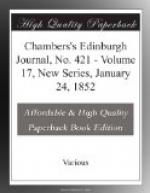Shots were by this time getting scarce among us. There was not a man had a charge left but old Wenzel, who had supplied us as long as he could; but at length, loading his own gun with his last charge, he laid it quietly in the corner, saying one didn’t know what use might be for it, and he never liked an empty gun.
Wenzel was the son of a small innkeeper at Grodno, but after his father’s decease, which occurred when he was a child, his mother had married a Russian trader, who, when she died, carried the boy to Moscow. There Wenzel bade fair to be brought up a Russian; but when a stepmother came home, which took place while he was still a youth, he had returned to his native country, built himself a hut in the woods of Lithuania, and lived a lonely hunter till the time of my story, when he was still a robust, though gray-haired man. Some said his Muscovite parents had not been to his liking; some that he had found cause to shoot a master to whom they apprenticed him at Moscow; but be that as it might, Wenzel hated the Russians with all his heart, and never scrupled to say that the gun which had served him so long would serve the country too if it ever came to a rising. So much for Wenzel’s story, by way of explaining what followed; but as I stood beside him that night at the hut’s single crevice of a window, I could have given Poland itself for ammunition enough to do service on the wolves. They had now left nothing but the bones of our horses, which they had dragged round and round the cottage, with a din of howlings that almost drowned our voices within. Then they seized on the bodies of their own slain companions, which were devoured to the very skins; and still the gathering was going on. We could see them coming in troops through the open glades of the forest, as if aware that some human prey was in reserve. The hut was strongly built of great pine-logs, but it was fearful to hear them tearing at the door and scratching up the foundations. The bravest among us got terrified at these sounds. Metski loudly avowed his belief that the wolves were sent upon us as a punishment for hunting on Christmas-eve, and fell instantly to his prayers. Wenzel flung a blazing brand among them from the window, but they did not seem to care for fire; and three of them were so near leaping in, that he drove to the log-shutter and gave up that method of defence. None of the party appeared so far overcome with terror as Count Theodore: his spirit and prudence both seemed to forsake him. When the wolves began to scratch, he threw himself




